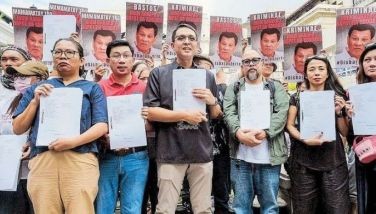DFA asks Senate to defer ratification of JPEPA
MANILA, Philippines – Foreign Affairs Secretary Alberto Romulo has asked the Senate to defer ratification of the Japan-Philippines Economic Partnership Agreement (JPEPA) until the government has sorted out the matter with Japan.
The Senate foreign relations and trade and commerce committees have recommended the treaty’s ratification on condition that it would not violate the Constitution.
In a letter dated April 23 to Sen. Miriam Defensor-Santiago, Senate committee on foreign relations chair, Romulo asked that the Department of Foreign Affairs be allowed to “exchange notes” with Japan.
Santiago said she would accede to Romulo’s request, as well as those of her colleagues, to give them time to study the JPEPA.
“The senators are asking for time to study the full committee report,” she said. “In this case, the senators told me that they find it hard to understand the resolution and its annexes. I don’t blame them because it is so technical.”
Santiago said she could not sponsor the JPEPA yet as scheduled on April 28 because she would distribute an explanation of the JPEPA in layman’s terms.
“The senators find it a very strange and new territory for them,” she said.
On the other hand, Senators Francis Escudero, Juan Ponce Enrile, Panfilo Lacson and Senate Minority Leader Aquilino Pimentel Jr. said the Senate should approve or reject the treaty without any conditions.
Santiago said the practice of conditional concurrence to a treaty was allowed under international law and was still being practiced in the United States.
“They are afraid because they don’t know about it. Fear is usually the result of ignorance,” she said.
“They’ve never had any experience with it. In the United States, they’ve been practicing it since the 19th century, nobody has ever objected.
“The United States has entered into treaties with the world’s greatest powers, especially with Russia during the Cold War, and Russia never objected.”
Escudero said a conditional ratification was already tantamount to a rejection of the treaty.
“Recommending a conditional ratification to my mind is an outright rejection,” he said. “If this is the path we’re taking, then we better say so. It’s either we accept the treaty or we reject it flatly.”
Escudero said the Vienna Convention of 1969 on the Law of Treaties does not recognize conditional ratification.
“If at all, international laws provide that a reservation can be made before the treaty is done,” he said.
“Why do a conditional ratification, which even the authors admit is a first for the Philippine Senate, when existing treaty and customary international law provides that we can ratify JPEPA subject to certain reservations?”
Escudero said the government should start backroom negotiations with Japan to determine if it would agree to the conditions imposed by the Senate for JPEPA’s ratification.
“If it would not be accepted in the first place, they would have to assess whether the treaty could stand on its own or be rejected,” he said.
Escudero said it would be up to the Philippines and Japan to decide whether a renegotiation of the treaty should be done.
He would not be signing the committee report because he disagrees with the legal procedure and methodology by which the recommendation was drawn in the Senate, he added.
Lacson said he was concerned about approving the treaty with conditions.
“First, will Japan accept it?” he asked.
“Second, what do you call it once the treaty is ratified? Third, will it pass the test of constitutionality? The growing consensus is for us to go into caucus and not go into an open debate on the floor to discuss the merits and demerits of conditional concurrence, if there is really such a thing.”
Pimentel said he was not aware of any conditional concurrence on the ratification of a treaty in the Philippine context.
“I don’t think it will give respectful signal to Japan,” he said. “It’s better that we outright reject it than come up with a roundabout way of rejecting it. I doubt it (conditional concurrence), I will oppose it.”
He would like the Senate to ratify the JPEPA without conditions, Enrile said.
- Latest
- Trending
































